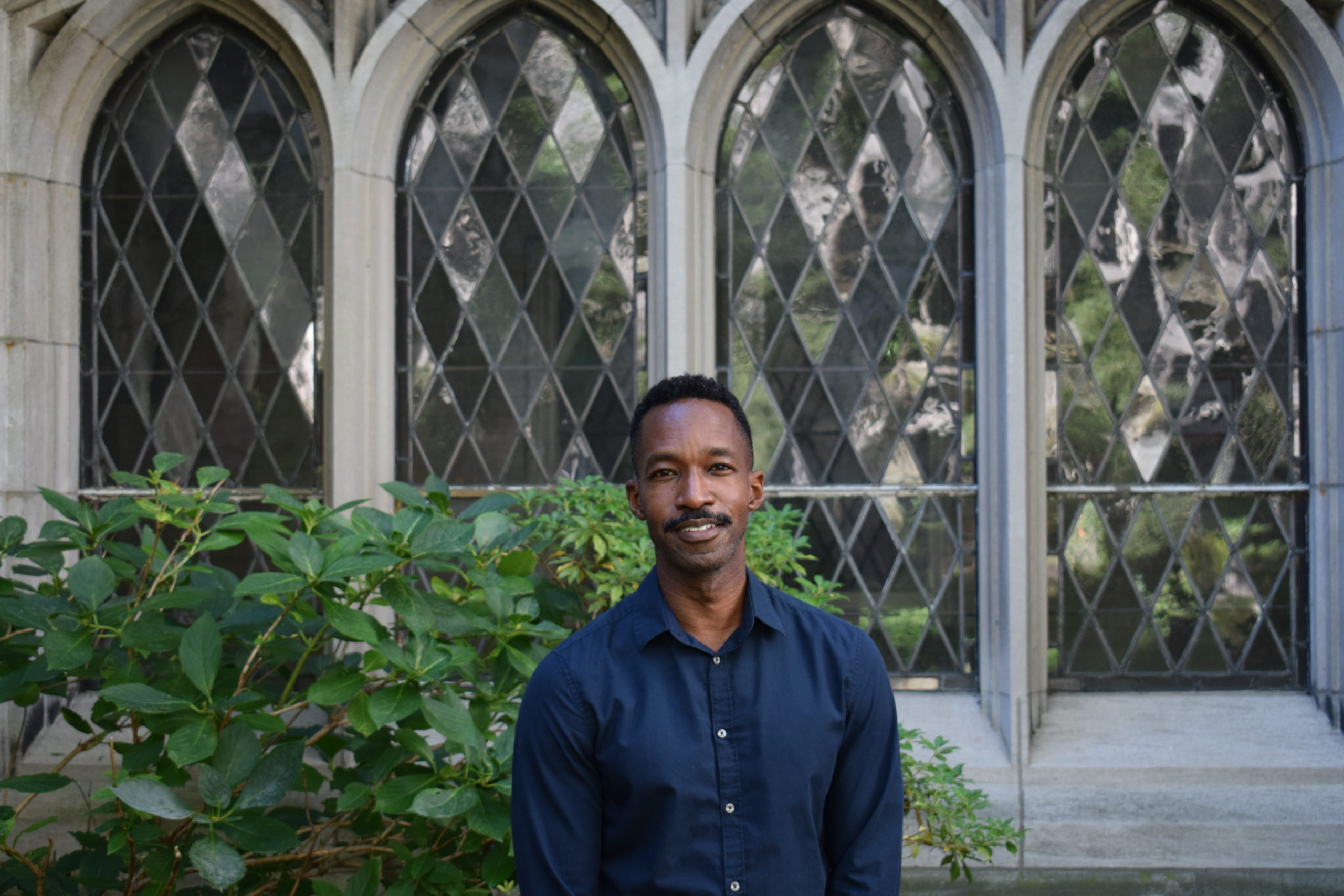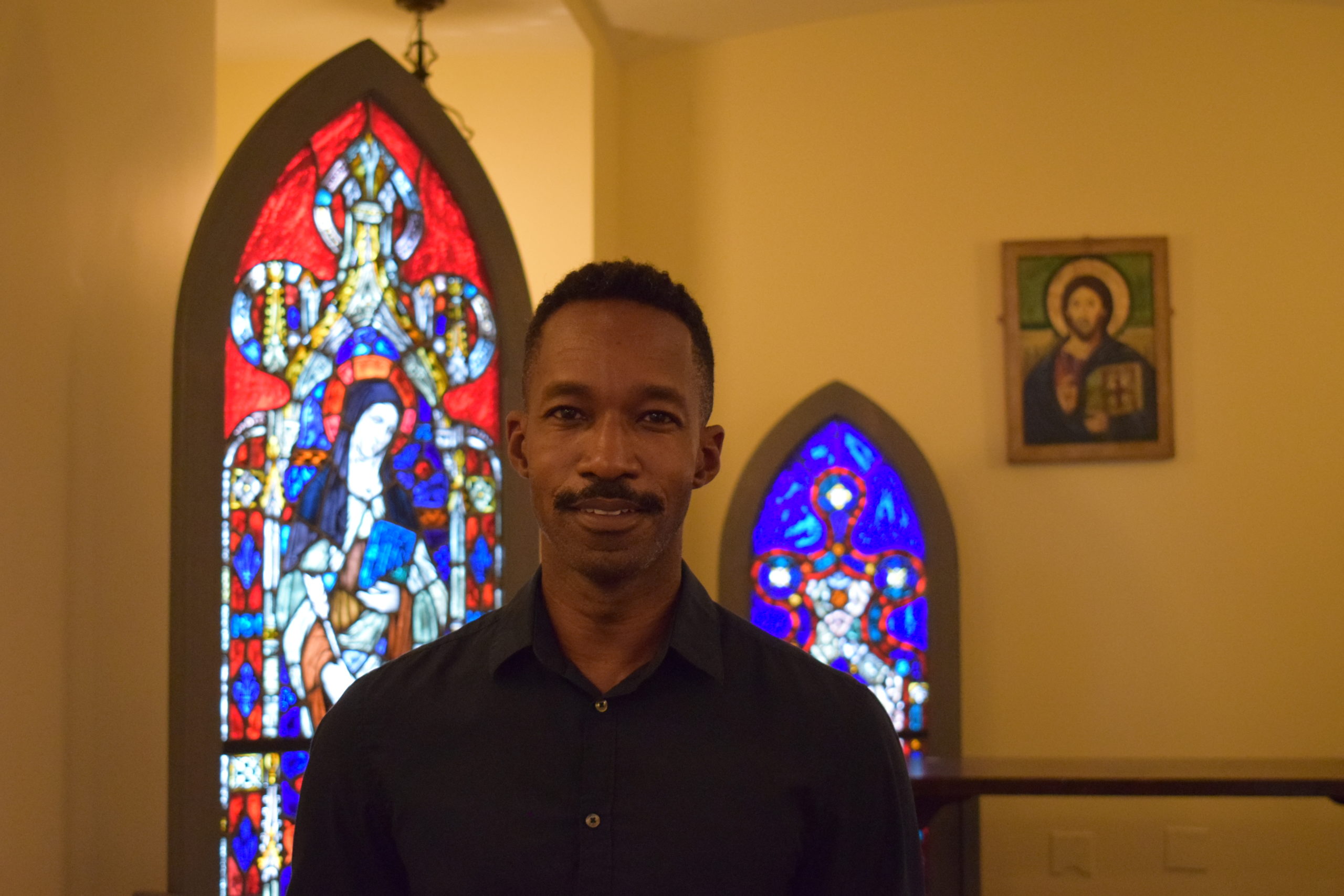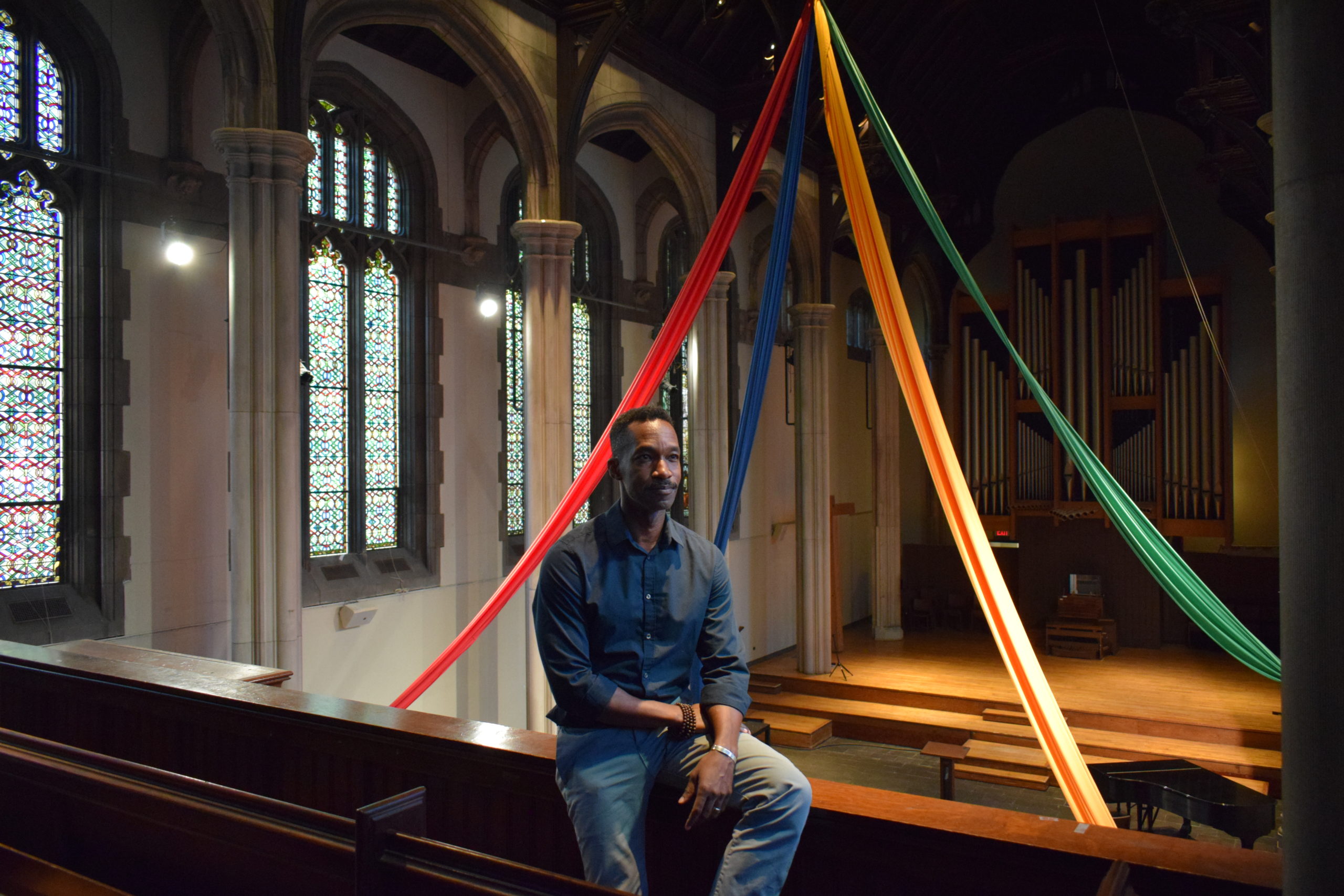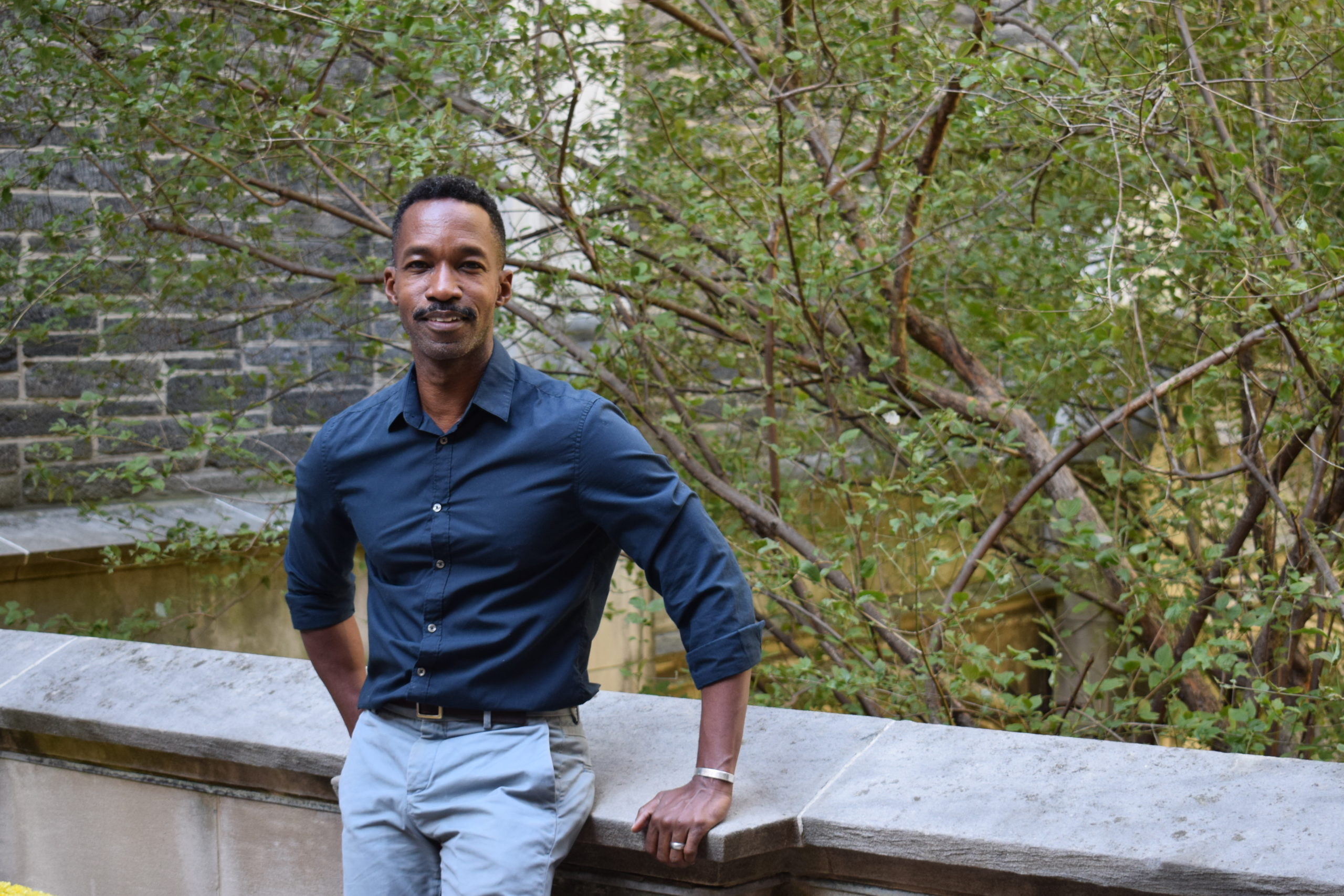4 min read
Rev. Bertram Johnson is one of Union’s Chaplains. In honor of National Coming Out Day on October 11, Rev. Johnson kindly offered his time to speak with Union. Union Theological Seminary is proud to be an affirming seminary.

Rev. Johnson, thank you so much for taking the time to speak with me today. To start, could you tell us a bit about who you are and your journey to serving as a Chaplain at Union’s Chapel?
I am an ordained pastor in Presbyterian Church (USA) and I’ve served congregations in Seattle and New York. LGBTQ ordination was affirmed by the denomination in 2011 and I was the first out African American to be ordained in 2014. I have always felt a particular affinity for chaplaincy. I have worked in cancer and HIV/AIDS care settings, but higher education had always been a particular dream. I joined the staff of UTS in January 2020.
Growing up Baptist in Northeast Florida, there was no space for talk about queerness. Being gay or different in any way was always looked down upon. The journey towards self-acceptance and loving myself as a beloved child of God, and as someone who went through the process of ordination, was really long, fraught, and emotional. There are still people in my life and family who are not in support of me as a gay, married man. I endured a lot of struggle around this. But the more that I’ve grown into my understanding of myself as a beloved child of God, the rest of that stuff doesn’t matter as much because I know my true identity. I can hold the complexities of being Black and queer and a pastor and know that I’m whole and accepted in all of it.
That is beautiful. Can you share a bit more about your journey to self-acceptance?
My journey towards self-acceptance was really delayed because of my experience with religion. I grew up in the seventies in a small rural community in Florida, and the practice of Christianity was so codified—not just around sexuality, but around race and gender too. Black people fit in this box, white people fit in this box, and queer people didn’t really exist, or were shunned, shamed, and rejected. Conversations around sexuality were unwelcome because being queer was categorized as a sin and an abomination.
During and after seminary, through theological study, good therapy, and supportive community, I came to understand the expansiveness of God’s love and grace. It was a lot of work and soul searching, but through it I could see there was a space for me. But even claiming my space with God and Spirit still meant that I was sometimes at odds with culture and community. So coming out for me meant being willing to risk rejection and potentially losing my connection to family and community. But there was so much more to gain in feeling whole and complete and loving myself. I chose to love myself and embrace God’s love more than living by the limitations of a narrow reading of scripture placed upon me.

Union is an affirming seminary. Can you speak about the necessity of being an affirming seminary in today’s religious and cultural landscape?
Every institution committed to justice and spiritual transformation has the responsibility to embrace the diversity of sexual expression. Queerness is a spectrum and there are so many ways to exist and show the diversity of God in the world. Each of us should be seen and affirmed. We’ve done so much to secure rights primarily for middle-class, white, folks who represent the dominant culture, that we forget and overlook people that we’ve moved the margins and away from power, whose experiences aren’t mainstream. Those communities, especially the experiences of trans folx and people of color, should be centered in our theologies. If we truly want to have a deeper experience with the Divine, we must expand our understanding of how Spirit speaks to us. The world won’t experience true equity and liberation without the inclusion of our trans siblings of color. Our theologies, seminaries, and faith communities are vital in accomplishing this. I’m grateful that Union is growing in creating space for this.
What work has Union engaged in, and what work does it continue to do, to ensure that it is a safe, welcoming, and liberatory place for queer people?
Many students come to UTS because it is queer-affirming and a leading voice in social justice. I think giving voice to students is probably the thing we do best. Alongside our outstanding professors, they are the ones who constantly push the envelope of what it means to be a justice-seeking institution. Through the freedom expressed in chapel and the work of the queer caucuses, the institution is challenged to live into the ideals it says it upholds. It’s hard work. Gender/sexual, racial, disability, and environmental justice—those are values we uphold at Union, and still we are working to embrace these more fully.
Also as a Chaplain I get to meet with students of different religious traditions, experiences, and identities. It is important to make space to care for the whole person—body, mind, and spirit, and affirm the heart and needs of all. I work with a lot of seminarians who are so focused on being successful in their academic work that they often lose sight that it was a deep and meaningful connection to Spirit that brought them here. All students, but queer students especially, benefit from receiving care that honors the uniqueness of their experience and the way Spirit affirms them in a society and religious institutions that still harm them daily.
I still think there are ways we can grow in connecting to voices that are often excluded. Even in progressive academic settings we sometimes gravitate to what is familiar and comfortable. The more that we uplift and amplify individuals and that are often overlooked, the more we will know the truth and the beauty of what the Divine holds for us.

For those people who may have questions in their minds about this, can you please share why from a faith-based perspective it is important to be inclusive of the queer community?
First off, queer people deserve the same rights, protections, respect, care, and compassion as everyone else. The anti-trans and “don’t say gay” laws being passed across the U.S. by ultra-conservative, theocratic religious leaders and elected officials threaten the lives and safety of LGBTQIA+ youth and adults with increasingly devastating impact. It’s shocking to see the rise and decline in LGBTQ protections change so swiftly. The impact of the previous presidential administration and what it unleashed poses a very real threat to our safety as individuals and as a nation.
That being said, from a faith perspective, queer people reflect and embody the beauty, diversity, and complexity of God and the Divine as all other humans do. As a Christian, I see the ways many manipulate power, law, faith, and sacred texts as a tool to control others which was the antithesis of Jesus teaching and liberating work. I believe that fuller inclusion of queer and trans people individuals into our spiritual communities helps us experience and understand the breadth and depth of divine love. Until we make every effort to welcome, shelter, and celebrate those we have previously excluded, maligned, and marginalized we will not know that love that God has for us. Listening to their wisdom and truth is how we will find our own liberation. It can’t just be for one group if we want this planet and society to survive.

Is there anything else you would like to share?
In addition to my part-time position at Union, I recently began work as a therapist with MCM Collaborative, a small psychotherapy practice founded by three queer Black and Brown therapists.
As a gay man who has spent years working to reconcile what I was taught about God, my call to ministry, and sense of belovedness, I’m especially interested in helping others find healing and integration of self from spiritual abuse. My vision is to walk with people as they rediscover divine love and find ways to heal the places that feel fractured within us. I’m excited to begin this new leg of my vocational journey and I’m hopeful for how my work there will make me a more effective chaplain at UTS.
“Coming out” is a spiritual journey. The sooner we can see and experience the Divine as lovingly ushering into our true selves, the quicker we can begin living from that place of love, confidence, and peace today.
